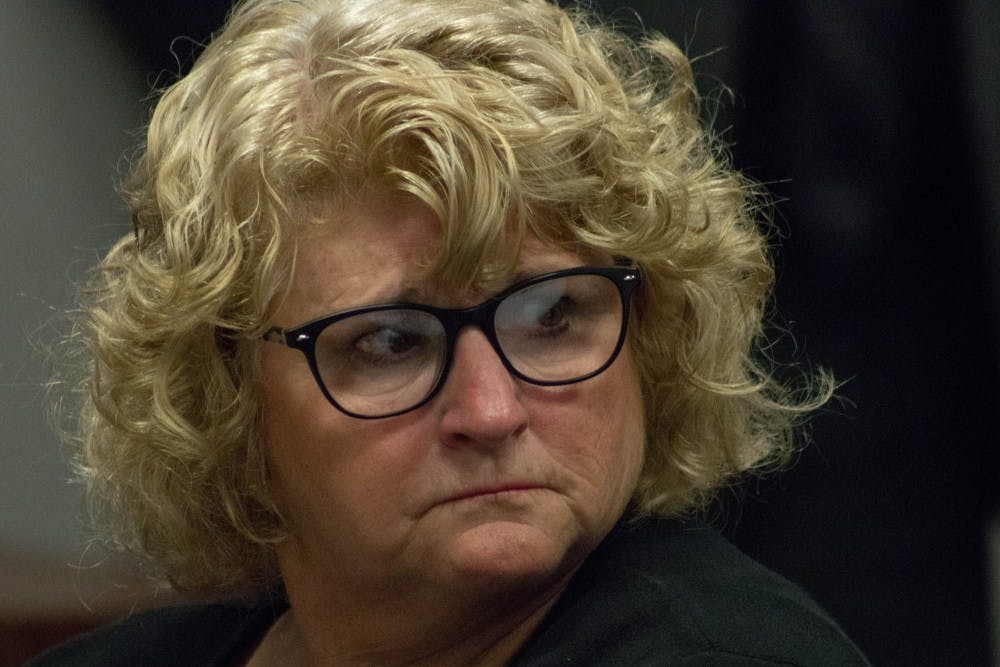Sufficient evidence was found to move the case of former MSU Gymnastics head coach Kathie Klages to trial, 54-A District Court Judge Louise Alderson ruled on Thursday.
In her preliminary hearing, Klages faced two charges of lying to a police officer during an investigation into MSU's handling of the abuse of ex-MSU and USA Gymnastics doctor Larry Nassar.
The decision to send the case to Ingham County Circuit Court came after Alderson reviewed the testimony of three witnesses and a transcript from an interview with Klages conducted by the Attorney General's office.
Klages faces one misdemeanor charge and one felony charge. The misdemeanor carries up to two years of imprisonment or a fine of up to $5,000. The felony entails up to four years in prison or a fine of up to $5,000.
Two women, Larissa Boyce and an unnamed witness, took the stand. Boyce, a survivor of Nassar’s abuse who spoke at his Ingham County sentencing, said that in 1997, she reported her abuse to Klages. Klages allegedly told Boyce that reporting Nassar could have serious consequences for Nassar and Boyce.
The third witness, David Dwyre, chief of investigations for the Attorney General's office, interviewed Klages in the office's investigation.
Mary Chartier, one of Klages’ attorneys, said the transcript from Dwyre’s investigation is not valid, citing 11 discrepancies between the recording and the transcript.
Chartier confirmed with Dwyre that he told Klages his interview during the investigation would be laid back and their conversation would not be recorded. However, Dwyre did record the interview and confirmed he lied to Klages.
Dwyre testified that Klages had denied any knowledge of Nassar's abuse before 2016 and that she said neither of the women, teenagers at the time, reported to her.
The unnamed witness also said they disclosed their abuse to Klages in 1997, when Boyce was 16 and the unnamed witness was 14. Both were members of Spartan Youth Gymnastics at the time.
Boyce said she told another gymnastics coach, who advised her to report to Klages. Klages then allegedly rebuffed Boyce, an experience the then-teenager said made her feel dirty and humiliated.
Boyce's testimony on Thursday echoed her victim impact statement from Nassar’s sentencing in January.
"I told somebody," Boyce said in her impact statement. "I told an adult. I told Michigan State University back in 1997."
The unnamed witness gave a similiar account of her abuse while competing as a gymnast at the time.
Chartier said that Klages — considered to be a mother figure to her gymnasts — offered support in the days following the Indianapolis Star story that publicized Nassar's abuse, encouraging her gymnasts to report.
Chartier went on to confirm with Dwyre that Klages said in the interview that a gymnast’s mother reported to Klages that her daughter “thinks she might have been assaulted by Larry Nassar.” Klages said she reported that incident to the university’s Office of Institutional Equity, before following up to make sure someone was going to contact the police. Chartier identified the gymnast as having competed in 2016 and 2017.
“What Larry Nassar did or didn’t do is immaterial, not to the young women who he impacted, but as it relates to this proceeding. The only thing that’s relevant is did Mrs. Klages lie to these agents when she was interviewed 21 years later and she said ‘I don’t remember, I don’t remember, I don’t remember,'" Chartier said. “What is a part of that transcript for this court to consider is that after 1997, she sent her own children to Larry Nassar. She sent her own granddaughter to Larry Nassar.”
To say that Klages lied to an investigator and impeded the investigation is false, Chartier said, imploring the judge to dismiss the case.
First Assistant Attorney General Bill Rollstin said the actions Klages did or did not take in 2016 after Nassar’s abuse had been exposed do not excuse the actions she took in 1997.
“The crime is committed when she says that no one ever told her about it,” Rollstin said.
Support student media!
Please consider donating to The State News and help fund the future of journalism.
Judge Alderson said the court has to step back and look at the testimony from 1997. She said both witnesses’ testimonies are credible and that the interview contained a denial by Klages to those accounts.
Klages’ case now goes to Ingham County Circuit Court. Klages’ lawyer told reporters that Klages maintains her innocence and that her defense will fight the charges at trial.
Discussion
Share and discuss “Kathie Klages' case to move to trial” on social media.








